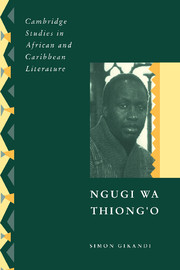Book contents
- Frontmatter
- Contents
- Preface
- Chronology
- 1 Introduction: reading texts and contexts
- 2 Narrative and nationalist desire: early short stories and The River Between
- 3 Educating colonial subjects: the “emergency stories” and Weep Not, Child
- 4 Representing decolonization: A Grain of Wheat
- 5 The poetics of cultural production: the later short stories and Petals of Blood
- 6 Performance and power: the plays
- 7 The prisonhouse of culture: Detained and Devil on the Cross
- 8 The work of art in exile: Matigari
- 9 Writing freedom: essays and criticism
- Conclusion
- Notes
- Bibliography
- Index
6 - Performance and power: the plays
Published online by Cambridge University Press: 09 February 2010
- Frontmatter
- Contents
- Preface
- Chronology
- 1 Introduction: reading texts and contexts
- 2 Narrative and nationalist desire: early short stories and The River Between
- 3 Educating colonial subjects: the “emergency stories” and Weep Not, Child
- 4 Representing decolonization: A Grain of Wheat
- 5 The poetics of cultural production: the later short stories and Petals of Blood
- 6 Performance and power: the plays
- 7 The prisonhouse of culture: Detained and Devil on the Cross
- 8 The work of art in exile: Matigari
- 9 Writing freedom: essays and criticism
- Conclusion
- Notes
- Bibliography
- Index
Summary
My basic argument up to this point is that Ngugi's career has been defined by a systematic attempt to master the form of the European novel and to see how its techniques can be brought to bear on the complicated cultures and histories of colonial and postcolonial Africa. I have argued that this engagement with the novel as an aesthetic object is as important as his evolving political ideology in the 1960s and 1970s. And yet, in spite of his numerous attempts to move the novel beyond its European bourgeois heritage - a heritage in which the genre is driven by the need to account for unique individual experiences for isolated and privileged readers - and turn it into an instrument of mass culture and collective change, Ngugi was, for most of this period, the archetypal intellectual writing about the experiences of “the people” from the sanctuary of the university. As we have already seen, the author's sense of his own alienation from his objects of representation, his awareness of the gap between the subjects of his novel (often peasants and workers) and the rarified mode of novelistic expression, became for him a source of artistic angst and ideological soul-searching in the 1970s. In these circumstances, Ngugi's occasional turn to drama was one way of dealing with the crisis that this African writer had to confront when he attempted to represent subjects and cultural situations that were at odds with the language and aesthetic ideology of his inherited novelist tradition.
- Type
- Chapter
- Information
- Ngugi wa Thiong'o , pp. 160 - 194Publisher: Cambridge University PressPrint publication year: 2000

